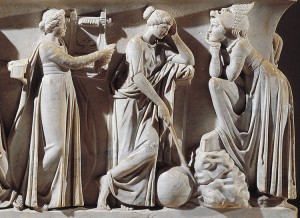Mythic Monday: Heed Your Muse
August 7, 2017
The Muses were nine graceful goddesses of art and inspiration in the mythology of the ancient Greeks and Romans. Each goddess ruled over a different art or science. The people they inspired included artists, poets, and musicians—even politicians.

The ancient Roman marble sculpture Sarcophagus of the Muses (at the Louvre Museum in Paris, France) depicts the nine Muses. This photo shows Erato, left, the Muse of love poetry; Urania, center, the Muse of astronomy; and Melpomene, right, the Muse of tragedy. Credit: © G. Dagli Orti, De Agostini Picture Library/Bridgeman Images
In Greek mythology, the Muses were nine beautiful sisters. Their father was Zeus, the king of the gods, and their mother was Mnemosyne, the goddess of memory. The Muses had melodic voices that made people forget their sorrows. The modern word music comes from their name. The sisters often sang as a chorus at Zeus’s royal court. They could see the past, the present, and the future. They could recall the truths of all events throughout all time, and their songs expressed those truths.
Each Muse governed and inspired a particular art or science. Greek and Roman artists often depicted them with symbols reflecting their specialties. They showed Calliope, the Muse of heroic poetry, with a writing tablet. Calliope was also the chief Muse. Clio, the Muse of history, often held a scroll. The Muse of astronomy, Urania, sometimes had a globe. Thalia, who inspired dramatic comedy, held a smiling mask, while Melpomene, who inspired tragedy, held a sad mask. The masks of comedy and tragedy remain symbols of the theater today. Artists often pictured Polyhymnia, the Muse of sacred song, looking thoughtful and meditative. They showed Euterpe (lyric poetry) with a flute, while Terpsichore (dance) and Erato (love poetry) each played a stringed instrument called a lyre. Ancient music and literature were closely interconnected. The Greek and Roman poets usually sang their poetry, and performers also danced and sang poetic verses in plays.
The ancient poets often began a poem or play with an appeal to the Muses for inspiration, hoping for divine help in composing works of timeless truth and beauty. It was said that the Muses, especially Clio, could help kings make eloquent speeches to settle conflicts and persuade people to live in peace. The Muses also helped scientists discover true knowledge. However, prideful people who thought they needed no help risked angering the Muses. Those people might wind up devoid of inspiration, singing untruths, or even mute—unable to speak or sing their songs at all.
Today, artists sometimes call a person who inspires them their “muse.” For a lack of good ideas, one might cry, ”I’ve lost my muse.” Sometimes, people call a new art form or type of writing the “Tenth Muse.”


